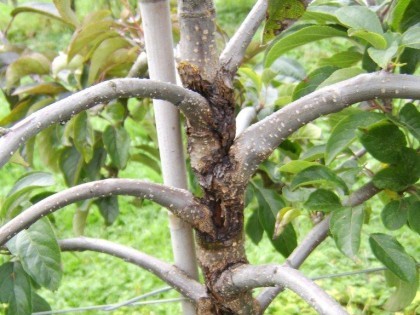
NIAB’s Matevz Papp-Rupar and Scott Raffle describe the latest research on apple canker, which is hoped to reduce the severe impact of the disease.
Apple canker caused by the pathogen Neonectria ditissima (Figure 1) continues to give rise to 10-20% tree losses per year in young orchards in the early years after establishment, and it is still considered one of the highest priorities for research by UK apple growers.
This new Growing Kent & Medway-funded project is exploring novel approaches such as biocontrol, alternative spray programmes, and soil amendments for improved tree health and resilience with the hope of improving canker management practices.
Collaborating with industry partners Agrovista and Avalon Fresh, the work has been split into three separate objectives, one examining ways of reducing stress at planting time and improving tree establishment, the second seeking ways to increase the quantity of beneficial mycorrhizal fungi in established orchards, and the third assessing novel spray products for control of apple canker at leaf fall.
In work to improve tree establishment, NIAB is experimenting with six newly planted commercial Gala orchards, some planted on sites prone to drought and some on sites prone to waterlogging.
Commercial evidence suggests that Gala orchards experiencing such extreme conditions brought about by climate change, are at greater risk of canker development. The project is seeking to use microbial soil amendments at planting time to improve tree growth and productivity. Commercial mycorrhiza and Trichoderma-based products have been applied to each orchard either alone or in combination. The mycorrhiza was sprinkled on the tree roots before planting, while a Trichoderma suspension was used as a pre-planting root dip.

During the life of the project, canker incidence, tree mortality and tree growth (measuring girth) will be recorded every six months to compare the treatments. Research in established orchards is seeking to find ways of increasing natural populations of mycorrhizal fungi. In an assessment of soils in four commercial established orchards, no natural mycorrhizal species were found, but researchers have demonstrated that their presence can improve soil drainage, soil health and nutrient uptake by the tree, which will enhance tree health, tree growth and the ability to withstand pathogen infection.
Wildflowers are known to support the growth of naturally occurring and introduced mycorrhiza, so NIAB is experimenting with wildflowers inoculated with mycorrhiza, which are being sown in tree alleys (Figure 2), in the hope that the mycorrhiza will spread into the established tree row.
Previous NIAB research has identified the optimum species of wildflower to use for attracting pollinators and beneficial insects into orchard crops. A selection of those was also shown to be compatible with mycorrhizal fungi and could provide improved soil performance and increased beneficial insect populations.
Additional work is examining the use of Agrovista’s modified root pruner, which dispenses mycorrhizal inoculum directly to the tree roots during the root pruning operation. Presence and populations of mycorrhiza will be recorded at both the beginning and the end of the project.
In researching alternative control agents, a wide range of substances are being assessed in a newly planted orchard which is being artificially infected by Neonectria ditissima. Products authorised for use in the UK but not currently on apple are included, along with biocontrol products with antimicrobial properties, which are being applied both with and without biostimulants and defence elicitors.
Examples of novel products being assessed include a food preservative that is systemic and has performed well in China, and a species of yeast which offers a protective shield to exposed wood and outcompetes other naturally occurring organisms.
This article originally appeared in the Autumn 2023 edition of NIAB’s Landmark magazine. Landmark features in-depth technical articles on all aspects of NIAB crop research, comment and advice. You can sign up for free and get Landmark delivered to your door or inbox:
